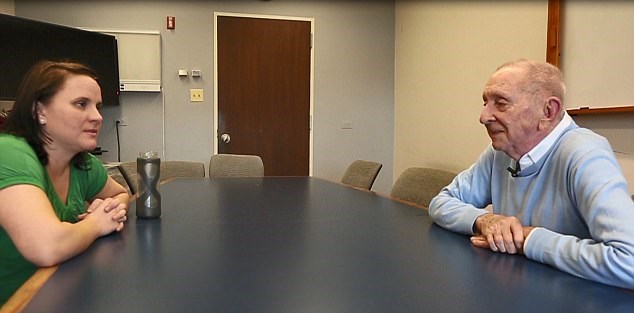The highly engaged and delightful conversationalist, who reads, volunteers and routinely researches questions on the Internet, is just as likely to talk to you about Chance the Rapper as reminisce about Frank Sinatra.
And now, his dynamic skill set is the focus of a groundbreaking scientific study at Northwestern Medicine study that shows there is such a thing as 'SuperAgers', a rare group aged 80 plus whose memories are as sharp as those of young people.
.jpg)
Over the course of the 18-month study, researchers have found SuperAgers' brains shrink much slower than their age-matched peers, meaning they have greater resistance to 'typical' memory loss and dementia.
Normal agers, meanwhile, lost volume in the cortex twice as fast as SuperAgers.
'Increasing age is often accompanied by 'typical' cognitive decline or, in some cases, more severe cognitive decline called dementia,' said first author Amanda Cook, a clinical neuropsychology doctoral student in the laboratory of Emily Rogalski and Sandra Weintraub.
'SuperAgers suggest that age-related cognitive decline is not inevitable.'
Donald, who lives with his daughter's family, is intent on being a good conversationalist with his three grandchildren.
'I have to adapt to that kind of life,' Donald said. 'They don't know much about Frank Sinatra or Franklin Delano Roosevelt, so I have to keep saying, "Is the Chance the Rapper coming this week or is it Taylor Swift?"'
.jpg)
The researchers already knew SuperAgers' brains tended to retain more brain volume and typically don't show the same wear-and-tear as normal agers.
'For this study we explored whether SuperAgers' brains were on a different trajectory of decline,' said Rogalski, associate professor at the Cognitive Neurology and Alzheimer's Disease Center (CNADC) at Northwestern University Feinberg School of Medicine.
'We found that SuperAgers are resistant to the normal rate of decline that we see in average elderly, and they're managing to strike a balance between life span and health span, really living well and enjoying their later years of life.'
Using magnetic resonance imaging (MRI), the scientists measured the thickness of the cortex in 24 SuperAgers and 12 same-age, educationally and cognitive average peers (control group) to determine the approximate health of the brain over 18 months.
The annual percent decline in thickness between the first and second visit for the SuperAgers was 1.06 and 2.24 for the control group.
Previous research showed that SuperAgers have a thicker cortex than those who age normally.
.jpg)
By studying what makes SuperAgers unique, the scientists said they hope to undercover biological factors, such as the reduced cortical brain atrophy demonstrated here, that might contribute to the maintenance of memory ability in advanced age.
SuperAger research at Northwestern is flipping the traditional approach to Alzheimer's research of focusing on brains that are underperforming to instead focusing on outperforming brains.
'Sometimes it's useful to turn a complex problem on its head and look from a different vantage point,' Rogalski said.
'The SuperAging program studies people at the opposite end of the spectrum: those with unexpectedly high memory performance for their age.'
According to Dailymail.co.uk








